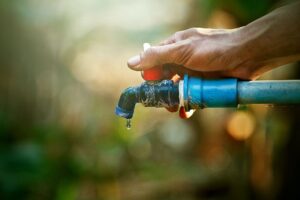Yesterday was World Water Day, which according to the United Nations, is meant to “celebrate water and raise awareness of the 2 billion people currently living without access to safe water.” Ever since 1993, non-governmental organizations and diplomats alike have treated the day as a call to action to provide the basic, fundamental right to clean water for their constituents.
During days such as these, we too often imagine poorer countries struggling to provide clean water. It’s time we turn our attention toward our own country’s issues in this regard.
As of this year, it’s estimated that around one in 10 Native Americans, of which 6.79 million live in the United States, don’t enjoy access to safe tap water or basic sanitation. Most of the water-poor tribes reside in the Colorado River Basin. Throughout California, Colorado, Nevada, Arizona, New Mexico, and Utah, tribes living on the land stolen from them can’t cleanly bathe or hydrate themselves. This is an issue exacerbated by the pandemic. Lacking access to proper sanitation increases the likelihood of infection.

Despite this renewed importance, we’ve taken few steps toward correcting the issue, which began long ago. Tribes across the Colorado River Basin agree that our country has violated its promise to provide Native Americans with livable land. Several treaties from centuries past, which tribes were tricked and coerced into signing, listed this as a condition. Unsurprisingly, we’ve mostly ignored these historical agreements.
The deck is stacked against those tribes seeking to make a difference. Not enough people know Native Americans on reservations don’t own the land on which they reside. Instead, the federal government holds it in trust. So, tribal leadership can’t use property taxes as a revenue generator to improve their clean water infrastructure.
As a result of these broken promises, Indigenous households are 19 times more likely than their white counterparts to lack indoor pipes for running water. For example, the Navajo Nation is 67 times more likely to live without running water. Most of them rely on hauled water, which is vastly more expensive than piped water. Partially because of these water issues, Indigenous Americans are twice as likely to die from COVID-19.
Systemic issues, as esoteric and vast as they might seem, always have real-life, devastating impacts.
The solution demands an equally fundamental reform: Giving land back to Indigenous groups. The federal government ceding control of reservations would permit tribes to generate revenue, use their land as private sector capital, and install other revenue-generating measures. Absent massive and consistent federal support, this can break down the systemic barriers between tribes and the private marketplace. All these potential funds can be used to fix and install pipes, which will ensure better health and sanitation, in turn improving the community overall.
Sometimes, the right fix is the simplest one. In concept, it’s an elegant, obvious solution to a longstanding issue. In execution, there’s sure to be legal and political obstacles. But the severity of this inequity and its historical elements demand a massive reformative effort.
